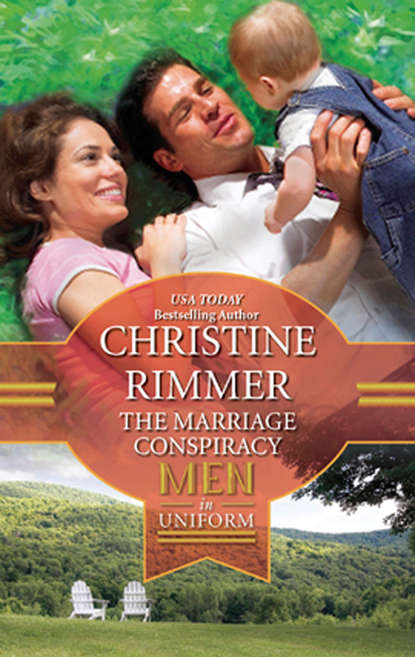По всем вопросам обращайтесь на: info@litportal.ru
(©) 2003-2024.
✖
The Marriage Conspiracy
Автор
Год написания книги
2019
Настройки чтения
Размер шрифта
Высота строк
Поля
“Stop calling me that. I am not your dear.”
“Joleen, I am trying to make certain that you understand your position here.”
Joleen blinked. This had to be a nightmare, didn’t it? It could not be real. “My position?”
“Yes. You are an unwed mother.”
Unwed mother. The old-fashioned phrase hurt. It made her sound cheap—and irresponsible, too. Not to mention a little bit stupid. Someone who hadn’t had sense enough to get a ring on her finger before she let a man into her bed.
Maybe, she admitted to herself, it hurt because it was all too true. She had not been smart when it came to Bobby Atwood. Which seemed funny, at that moment. Funny in a sharp and painful way. A tight laugh escaped her.
“Don’t try to make light of this, Joleen.”
The urge to laugh vanished as quickly as it had come. “I promise you, Mr. Atwood. I am not makin’ light. Not in the least.”
“Good. For child care, you rely on your family members, and they are not the kind of people who should be caring for my grandson.”
Joleen thought of that paperweight again—of how good it would feel to grab it and let it fly. “You better watch yourself, insultin’ my family.”
Robert Atwood shrugged. “I am merely stating facts. Your mother, from what I understand, and from what I witnessed today, is sexually promiscuous. Your younger sister has been in serious trouble at school and was arrested last year in a shoplifting incident. Your other sister has had some problems with the law, as well. None of those three—your mother or those sisters of yours, are the kind I would trust around my grandson. If it comes down to it, I will have little trouble convincing a judge that females like that aren’t fit caregivers for Samuel, that he would be much better off with Antonia and me.”
Joleen couldn’t help it. She raised her voice. “‘Females like that’?” she cried. “Just who do you think you are, to call my family females like that?”
“You are shouting,” said Robert Atwood.
“You’re darn right I am. I was warned about you and I should have listened. But I didn’t, and look what has happened.”
“Joleen—”
“That is all. That is it. You won’t get my baby, don’t think that you will. And I want you out of my mother’s house.”
Right then the door to the front hall swung inward. It was Dekker, all six foot three and 220, or so, very muscular pounds of him. “Joleen. Everything okay?”
The sight of her dear friend calmed her—at least a little. She said quietly, “Everything’s fine. The Atwoods were just leaving.”
“You’ll be hearing from my attorney,” Robert Atwood said.
“Fine. Just go. Now.”
Apparently, he’d said all he came to say. At last. With great dignity he guided his wife toward the door.
Which Dekker was blocking. “What’s this about a lawyer?” he demanded.
Robert Atwood spoke to Joleen. “Tell this thug to step out of my way.”
Joleen longed to tell Dekker just the opposite—to ask him if he would please break both of the Atwoods in two. But, no. It wouldn’t be right to kill the Atwoods. Not on DeDe’s wedding day, anyway.
“It’s okay, Dekker. Let them go.”
Dekker, who had a fair idea of what had been going on in Samuel’s study, stepped aside reluctantly. The Atwoods left the room. He followed them, just to make certain they got the hell out.
Once they went through the front door, he shut it firmly behind them. Then he returned to Joleen.
She was standing by her father’s desk, a pretty woman in a long dress that was not quite pink and not quite red. Her heart-shaped face was flushed, her full mouth tight. A frown had etched itself between those big brown DuFrayne eyes.
Dekker quietly closed the door.
Her mouth loosened enough to quiver a little. “Please don’t say ‘I told you so.’”
Just to make sure he had it figured out, he said, “They want to take Sam away from you.”
He hoped that maybe she would tell him it wasn’t so. But she didn’t. She picked up a brass paperweight of a Yankee soldier on a rearing horse from the edge of Samuel’s desk. “I thought about smashing Robert Atwood in the face with this.”
Dekker shook his head. “Bad idea. And, anyway, violence is not your style.”
“Right now I feel like it could be. I feel like I could do murder and never think twice.”
“You couldn’t.”
She clutched the brass figure against her body and looked at him with fury in her eyes. “He called my mother promiscuous, Dekker. He said Mama and DeDe and Niki weren’t fit to take care of Sam. He raised a shallow, sweet-talkin’ lowlife like Bobby—God forgive me for speakin’ ill of the dead—and he has the nerve to come in my mother’s house and say that my people are not good enough to do right by my child, that I am not good enough, that—”
In two long strides, he was at her side.
She looked at him with a kind of bewildered surprise—that he had moved so fast, or maybe that, in moving, he had distracted her from her rage. “What?”
“Better give me that.”
She only gripped the paperweight tighter. “He offered me money, Dekker. Money for my baby. Five hundred thousand dollars to let them have Sam.”
Dekker swore. “I’m sorry, Jo. You shouldn’t have had to listen to garbage like that.” He put his hand over hers. “Come on. Put this thing down….”
She allowed him to pry her fingers open. He set the paperweight back in its place on the desk. Then he took her by the shoulders.
“What else?” he asked, when she finally met his eyes.
She swallowed, shook her head as if to clear it of so much hot, hurtful rage. “When I…when I told him no, that I wouldn’t take his money and he could not have my child, he started talkin’ lawsuits, how he would not have any trouble convincing a judge that Sam would be better off living with him and Antonia.”
Predictable, thought Dekker. He said, “Anything more?”
Those big eyes narrowed. “He knew. About how Niki got picked up for shoplifting last year. And he seemed to know about DeDe, about her little joyride in that stolen car.”
In fact, it was one of Niki’s friends from the bad-news crowd she’d been hanging around who’d actually tried to walk out of the department store with a cashmere sweater under her coat. But Niki had been there. She had known of the attempted theft and done nothing to stop it. And before that, there had been a series of incidents at school, bad grades and detentions, minor vandalism of school property and truancies, too.
As for DeDe, between the ages of fifteen and eighteen, she had been a true wild child. She went out with bad boys, she drank, she experimented with drugs. She’d ended up before a judge after the incident with the car, when she’d hitched a ride with a boy she hardly knew. The boy had shared his bottle of tequila with her and taken her down I-35 at a hundred miles an hour.
She’d gotten off easy, because it was her first arrest and because she hadn’t known that the car was stolen and because, by some miracle, the judge had believed her when she swore she hadn’t known. But she’d come very close to doing some time. After that, she’d cleaned up her act.
The problem with Niki and DeDe, the way Dekker saw it, was losing their father—and not getting enough attention and supervision from their mother. Camilla loved her girls with all her heart, but she’d been sunk in desperate grief for the first year or two after Samuel’s death. And since then she was often distracted by all the boyfriends. She also worked long hours at the salon that she and Joleen now operated together.











